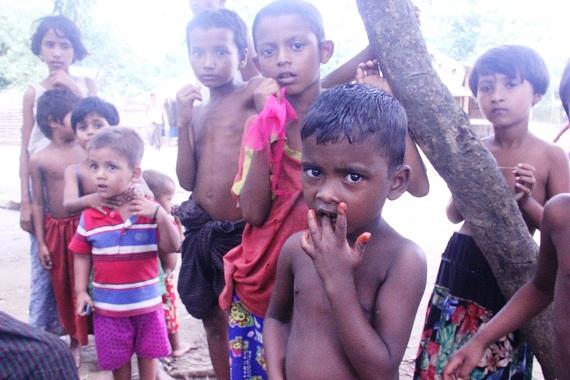HEADLINE
Rohingya Babies Dying in Government Camps
"Government doesn't allow food for children"
Phyu Zin Poe

For three years, Khin Mar Saw has been living in this 10 square feet bamboo shelter in a camp in Sittwe. It’s home for her seven member family.
They have been surviving completely of donations from aid groups.
It’s lunch time and she and her sister try and work out what they feed the family. She asks her sister where the beans are. She replies that she sold them.
When communal violence between Rakhine Buddhist and Rohingya Muslim erupted in 2012, they fled their home in a fishing boat and came to live in the Sittwe camp.
“I was pregnant at the time. I was so hungry but I had no money to buy food. I wanted to eat an apple and I wanted an orange, I wanted to eat Arakan noodles but I couldn’t find anything like that. We struggled to eat just basic meals," she said.
Before I gave birth, I wanted to kill myself. I had no energy and my blood pressure was down. I had nothing to eat that could nourish me or my baby. It took me three days to deliver him and now he’s gone,” she added.
Her son died at 7 months mostly likely from malnutrition.
Since 2012, when violence erupted between Muslims and Buddhists the government has herded tens of thousands of Rohingya from Sittwe and other towns and villages into camps.
Some 120,000 Rohingya live here in rows of flimsy bamboo huts without electricity.
The Rohingya here are barred from leaving, a rule that applies even to those who have homes just outside camp boundaries.
They are forced to live only off rations from the World Food Program.
Each month, she gets about 10 kilograms of rice, about 150 grams of beans, and a liter of oil.
Her ration didn’t include kitchen supply such as coal for cooking.
There is no electricity in the camp and off she has to sell food to buy fuel to cook.
“I have run out off coal so I think to need to sell rice to buy coal. I also have to sell rice when I am sick to buy medicine,” she said.
Last week, a government owned newspaper published a story saying refugees are well off in the camps and are reselling their rations.
Khin Mar Saw’s says her rations haven’t arrived this month.
“They have been delayed three weeks. So we have had to borrow food from a nearby village. Once we get our rations, we have to pay them back,” she said.
The Camps are guarded to make sure nobody leaves a 8 kilometer radius around the camp.
There is no official record available on how many people have tried to escape.
The Arakan immigration official said there are 195 people returned back to camps after inhumane journey.
There is no action taken against to those refugees who try to escape but the government is chasing up the brokers.
People here are desperate to go back to their villages or travel and find refugee in another country. Many died trying to make it.
Hla Thein is the speaker of Arakan state’s government.
He says the government is doing enough for refugees.
“The World Food Program planned to reduce the amount of foods ration for refugees but our government negotiated with them to continue their support because the government do not have capacity to support foods to refugee. But WFP doesn’t want to support refugees for long time,” he said.
To find a long term solution, he says the government plans to resettle the community in a different area.
“We have a plan to restore their lives. Now, we are building their houses. Once the buildings are finished we can move them there and they can generate their income. One area we will send these refugees to is the Khangdoatkhar village because the village situated with farm lands that they can farm and it’s located near the sea so they can fish,” he said.
This plan has been discussed for three years but still has not implemented yet.
While they wait, mother’s like Sein Sein are desperately trying to keep the children alive with the little rations they have.
“What can we do? We go hungry to feed our children from our foods,” she said.
Maung Hla, a refugee who helps with the distributor of food, says the government doesn’t allow the WFP to hand out ratios for babies.
“We informed WFP about the new born children but they say without government approval they can’t do anything,” he said.
The government denies this and the World food program were not available to comment when asked about this.
- Burma
- Myanmar
- eng
- Rohingya
Komentar (0)
KBR percaya pembaca situs ini adalah orang-orang yang cerdas dan terpelajar. Karena itu mari kita gunakan kata-kata yang santun di dalam kolom komentar ini. Kalimat yang sopan, menjauhi prasangka SARA (suku, agama, ras dan antargolongan), pasti akan lebih didengar. Yuk, kita praktikkan!